|
|
|
|

|
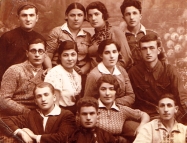 |
|
Kibbutz Lida
Shortly after leaving Radzilow, 1935
[His future wife, Zipora Smorgonski, to his left] |
|
| |
|
Abraham Kielczewski (Kilchevsky in Israel) was born in Radzilow in 1910
to Wolf Lejba (Arieh-Ze'ev) and Chaja nee Kalmaniewski (Kalmanovsky). His family was
very religious and during the days he studied at a regular Polish school,
while in the evenings he studied Hebrew and Torah at home with his
brothers and sisters. He belonged to the youth organizations "Ha'Halutz
Ha'Tzair" and "Ha'Shomer Ha'Tzair" and helped in their management by being
the treasurer, troop guide and activity organizer.
|
|
|
|
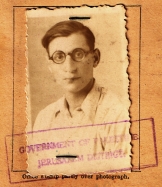
|
|
Abraham Kielczewski
Palestine Identity Card, 1939 |
|
|
| |
|
In 1933 Abraham was sent by "Ha'Halutz Ha'Tzair" to participate in
training in preparation to make aliyah to Israel. At first he was sent to
a kibbutz in Poland called Vilozny, but after a short time he was
transferred to Kibbutz Lida (also in Poland) where he met his future wife
Zipora Smorgonski from Dolhinov (Dolginovo). After about two years in Lida
he was sent to Vilna (Vilnius) to go through one more course before making
aliyah.
Abraham finally made illegal-aliyah in 1939 aboard the Hagana ship "Atrato."
When the ship reached the shore of Haifa and everyone was on the beach the
British Police arrived and would not grant them access to the country.
Eventually a troop of Hagana soldiers arrived and freed them after about a
week’s stay on the beach. All the new immigrants were sent to Atlit and there
they received a warm welcome and a big party in their honor. After a short stay
in Atlit, Abraham was sent to Kibbutz Ramat Rachel with a few others, but after
a short stay he eventually settled in nearby Jerusalem. There he was reunited
with Zipora who had made aliyah a year earlier and was staying with her sister.
They were married in 1941 and after the independence war, which Abraham spent
building fortifications, moved to Rehovot where he worked as a tailor and Zipora
raised their three sons (born 1945, 1946 and 1949).
In 1951 Abraham moved the family to Ramat-Gan where he opened a small tailor
shop near their apartment on 9 Truman Street. He went to "Mishkan Shalom"
synagogue on Ha’Roeh Street every day for services.
Abraham was a smart, serious, loving, honest and trustworthy man. He passed
away from a heart attack in 1979 at the age of 69 and is buried at Holon
Cemetery. He and his sister Sarah Krakowski (nee Kielczewski) were the only
survivors from their family in Radzilow. Abraham’s descendants today (2008)
include 3 sons, 9 grandchildren and 4 great-grandchildren. |
|
|
|
|
Article: This week 30 years ago, The Hagana boat "Atrato"
|
|
|
 |
|
Article About
the Atrato |
|
|
Translation: On January 15 1939, this week 30 years ago, the
Greek boat "Atrato," under Panamanian flag, sailed and arrived at the
country’s shores and disembarked 300 illegal immigrants. This was the
second trip of the Hagana boat "Atrato" from the Italian seaport of Ancona.
It was a relatively light boat, fast and easy to
sail, but it was not a boat designed to carry people and at these
quantities. Indeed, when the "Atrato" tried to transport immigrants from
Yugoslavia - the Yugoslavian authorities refused to allow this boat to
collect the immigrants, and it was necessary to lease a coastal boat that
collected the people and transferred them to the "Atrato" at deep seas.
The "Atrato" made six trips at the service of Aliya Bet Institute, [a code
name given to the illegal immigration of Jews to Palestine], and was
not caught by the British. Almost every month it arrived at the shores
of this country with human cargo, pioneers and refugees, and
disembarked them at shore safely. At the seventh time, it was caught,
including its 400 passengers, by the British destroyer "Roton." It
happened in 28 May 1939. All in all, the "Atrato" delivered 2,423
persons to this country. |
|
|
|
|
|
|
|
Kibbutz Lida, 1935
|
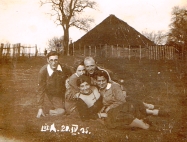 |
|
Kibbutz Lida, 1935 |
|
|
|
|
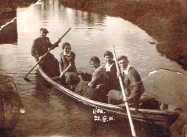 |
|
Kibbutz Lida, 1935 |
|
|
|
|
|
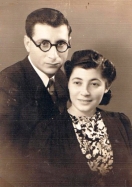 |
|
Abraham Kielczewski and wife Zipora
Israel, 1941 |
|
|
|
|
|
|
|
Material and biographical account courtesy
of Amir Dekel; Article translated by Amnon Even-Kesef |
|